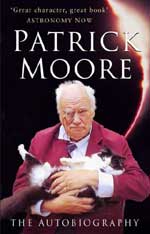
For those unaware, Patrick Moore or officially, Sir Patrick Moore, is the host of British Broadcasting Corporation’s “The Sky at Night”. He has been hosting this live television show regularly for in excess of 45 years, consisting to date of more than 600 programmes. He brought eclipses, lunar landings, and sinking eggs to a couple of generations of avid space buffs. He started on this trail well before rocketry came into vogue, and, by being in the right place at the right time (or putting himself there), he has managed to get acquainted with many of the luminaries of the field. But like any true person, he has a less than stellar side that he’s not afraid to show. He remains very opinionated about Germans and Italians because of his experiences in World War II. He worships cricket despite his noted lack of distinction. And he has a particular loathsome appreciation for things bureaucratic. The resulting open and honest self-appraisal, coupled with an energetic and vivid writing style, makes this book a real treat.
For the most part, the text follows a chronological sequence. An apparently difficult childhood is glossed over though the source of his love for astronomy appears to have started from reading a related book when he was six year old. Apparently he was about 30 when astronomy became part of his career. Thereafter follows a steady progression of book writings, speeches, occasional forays into directing a planetarium and, of course, presentations on the television show. Remember that while rocketry was in its infancy, television was not significantly further along. This, coupled with a live performance, made for many hilarious sounding spectacles. Studio sessions were perhaps a bit more sedate, but challenges arose. Imagine having a last minute guest star that, as it turns out, cannot speak English or any other language known by the host. Field sessions were, understandably enough, much more open to the elements. Clouds covered eclipses moments before totality, or camera operators focussed on their own subject instead of the sun’s dancing chromosphere. But it isn’t the events that take the spotlight in the book, it is Sir Patrick’s reflections of them which if not always humourous are, nevertheless, vibrant.
For those who know a bit about Sir Patrick because of his very public presence, the book can provide a deeper insight. A fair amount of his involvement with cricket gets in, though I must admit that with my lack of understanding of the game, I was usually at a loss. Still when he describes his throwing style as likened to that of a wallaby doing a barn dance, I get the picture. Also, there are many references to British leaders, activities of the European Union and changes to British society that I, as a North American, probably don’t appropriately appreciate. However, I can certainly feel the sorrow and loss Sir Patrick describes upon the enforced cessation of the Royal Greenwich Observatory. His other pastimes include playing musical instruments, especially the xylophone, and performing in amateur theatre productions. With all this, a reader can readily appreciate that Sir Patrick had a much fuller and rounder life than purely reporting on astronomical topics.
There is a slight sense of choppiness in the writing style. Perhaps because it is due to Sir Patrick typing the full manuscript on a typewriter that is older than he was. Nevertheless, the many years experience of writing books, papers and presentations serves him well because the result is a pleasant, easy reading prose that can often leave the reader laughing out loud. Seldom seen words like ‘bowdlerized’ appear, but quite rarely. Also, though ostensibly chronological, there is some jumping to and fro as well as the occasional repetition. In spite of this, there is no difficulty in reading, rather much enjoyment.
Autobiographies can and should give a glimpse into a person’s soul. Patrick Moore in his book Patrick Moore, The Autobiography does this in style. In noting down opinions and conjectures rather than emphasizing facts and events, the reader can readily understand who Sir Patrick is. And given the lack of self import and the flavourful writing style, there is both fun and insight of a principal character who undertook and is still undertaking solid service in the outreach of space and astronomy.
To get your own copy, visit Amazon.co.uk.
Review by Mark Mortimer
